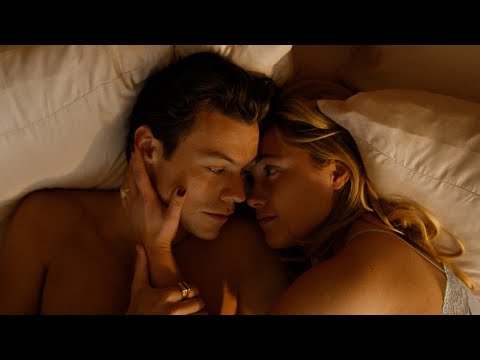“Don’t Worry Darling” can’t get out of its own way.
Director Olivia Wilde’s second feature confirms her knack for gorgeous details. That aesthetic sense, flashed in 2019’s “Booksmart,” looms large over this dystopian drama. She’s not a visionary, yet, but she’s knock-knock-knocking on that cinematic door.
Too bad her loud and proud feminism keeps invading the screen. A subtle touch may have made “Darling” a winner, if not exactly Oscar bait.
Instead, we’re left with an obvious message movie bereft of surprises. Perhaps Wilde can revisit the material one day and give it the storytelling spit polish it deserves.

Florence Pugh and Harry Styles star as Alice and Jack, a beautiful couple living in a beautiful cul-de-sac in beautiful ‘50s era USA. Jack toils for the Victory Project, a mysterious company overseen by a boss who doubles as a motivational speaker.
That’s Chris Pine, oozing charisma despite the role’s paper-thin shadings. Wilde compared Pine’s character to Jordan Peterson in the press, which only proves she’s never heard a thing Peterson has said over the years.
Alice and Jack seem content, and their passions overflow via elegantly orchestrated lovemaking. That they lack a spark otherwise is a bug plaguing Katie Silberman’s script.
Or is it?
Their relationship hits a rough patch when Alice begins questioning the unofficial rules surrounding their bucolic neighborhood. Suddenly, she feels trapped in paradise, with apologies to the 1994 film with Dana Carvey.
A new clip from ‘Don’t Worry Darling’ has been released. pic.twitter.com/kwkCCmqrME
— Film Updates (@FilmUpdates) September 14, 2022
Audiences may guess the truth behind “Don’t Worry Darling” early. No one will miss the film’s obvious messages regarding The PatriarchyTM and ’50s America. The decade, a prosperous age rife with gender and race discrimination, is a favorite Hollywood punching bag.
Wilde and co. have more on their mind that a standard-issue critique, to their credit. The story still slogs along, content to share surface-level observations and redundant lectures on social inequalities.
The less one knows about “Don’t Worry Darling,” the better beyond that. Just know that as the movie casts off its initial trappings your interest will intensify.
Somewhat.
Like “Honk for Jesus. Save Your Soul,” “Don’t Worry Darling” hits obvious targets early and often. Yes, men ruled the roost in the 1950s, an era when housewives greeted their spouses at the door, drink in hand, to quench their manly thirsts.
We’re not fully engaged by the characters, from Wilde as a deliriously happy neighbor to Jack’s co-workers. Why bring Nick Kroll to the party if you’re not going to deploy his madcap wit?
View this post on Instagram
Pine’s character may be the biggest disappointment. He looms large over his employees, spouting generic wisdom meant to share something profound or, hopefully, illuminating about the big picture.
Wilde’s, not ours.
There’s nothing much to explore here, though, even though Pine invests everything into the role. Watching him feels like a waste of natural resources. He needs to play an oily politician, stat, the kind who can cajole his enemies through sheer force of will.
Pugh is excellent as always, but she’s mostly relegated to victim status. As for Styles, he’s got the era’s look down cold in just his ‘do alone, but his character never emerges beyond that initial portrait.
RELATED: ‘BOOKSMART’ DEEMED NOT WOKE ENOUGH
The film’s third act features a dramatic tonal shift, and it’s here where our interest perks up. Just know Wilde has a knack for alarming visuals as well as the more comforting variety. If they ever get around to remaking “Logan’s Run,” she should top the list of potential directors.
“Don’t Worry Darling” arrives with both Oscar buzz and a trail of unwanted gossip. The film swiftly disconnects from that press maelstrom, and credit goes to Wilde and co. What the film can’t do is shake off the screenwriter’s intentions long enough to warrant all that attention.
HiT or Miss: “Don’t Worry Darling” is gorgeous from start to finish, but the film’s baldly feminist trappings interrupt the film’s small pleasures.
The post ‘Don’t Worry Darling’ Slams the Patriarchy. Again and Again appeared first on Hollywood in Toto.